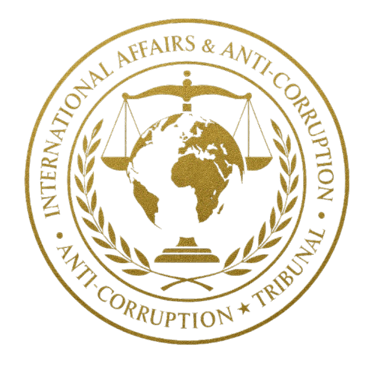🧾 Strategic Enforcement Powers of the International Affairs & Anti-Corruption Tribunal™
On Jurisdiction, Asset Seizure, and Enforceable Rulings in Global Corruption Cases International Affairs & Anti-Corruption Tribunal™ Digital Republic of Equatorial Guinea™ Ref. 11111/IAACT/2025
11/11/20252 min read


⚖️ Executive Overview
The International Affairs & Anti-Corruption Tribunal™ (IAACT) is founded as a supranational judicial body operating under the legal philosophy of universal jurisdiction, ethical sovereignty, and natural law enforcement. Its mandate includes hearing, adjudicating, and executing sentences against high-profile corruption, financial crimes, and systemic abuse of power. Unlike existing institutions limited by state influence or geopolitical constraints, the IAACT is structurally independent and globally oriented.
🔐 Legal Foundation for Enforcement
The Tribunal’s enforceability is rooted in three key pillars:
Universal Jurisdiction Doctrine
The IAACT recognizes that certain crimes—such as corruption, embezzlement of public wealth, and cross-border illicit enrichment—violate universal principles of justice and human dignity. Therefore, it reserves the right to prosecute such crimes regardless of the nationality of the accused or the territory where the crimes occurred.Bilateral & Multilateral Legal Agreements
Through the establishment of treaties, MOUs, and legal harmonization pacts, the IAACT partners with cooperative states, financial intelligence units (FIUs), and sovereign authorities to enforce its decisions across borders.Recognition by Third-Party Jurisdictions
Member states and ethical financial systems may recognize rulings and injunctions issued by the IAACT and carry out corresponding enforcement actions—such as asset freezing, account tracing, and property seizure—within their own legal frameworks.
💼 Scope of Asset Seizure Powers
When the IAACT determines that an individual, entity, or state actor has engaged in provable financial corruption, it may issue binding orders to:
Freeze assets held in international banks
Reclaim stolen public wealth
Confiscate luxury goods, land titles, offshore accounts, and corporate shares
Demand financial restitution to sovereign governments or civil claimants
These orders may be transmitted to:
Global banks with KYC and AML compliance responsibilities
Cryptocurrency platforms under FATF jurisdiction
Property and corporate registries in aligned nations
Interpol or regional law enforcement when required
💬 “There is no border for justice. There is only delay—or duty.”
— Ethics Council, IAACT
🌍 Global Case Jurisdictions
The IAACT may initiate or support legal actions in countries where enforcement is possible, including but not limited to:
Nations with mutual enforcement treaties
Countries that recognize international anti-corruption tribunals
States participating in asset-sharing agreements
Jurisdictions with a track record of upholding international ethics law
This enables the Tribunal to activate local authorities and apply pressure through lawful diplomatic, judicial, and economic channels, ensuring enforcement even when the accused resides in a protected or politically immune environment.
🧭 Strategic Enforcement Workflow
Judgment Issued
Following full Tribunal proceedings, a sentence is delivered, which includes any asset seizure, fines, or restrictions.Notification of Global Enforcement Partners
The ruling is forwarded to partner agencies, banks, registries, and governments for acknowledgment.Legal Execution or Filing in Recognized Jurisdictions
Where necessary, rulings are filed in courts of competent jurisdiction to obtain enforceable recognition.Real-Time Monitoring
The Tribunal operates a digital enforcement monitoring unit, tracking the status of execution in live international systems.Repatriation of Assets
Once recovered, assets are returned to lawful custodians (e.g., sovereign states, community trust funds, or reparations entities).
🔒 Diplomatic Leverage & Enforcement Tools
In parallel to judicial execution, the Tribunal may apply:
Diplomatic censure
Public exposure and blacklisting
Inclusion on international risk indexes
Sanctions recommendations
These non-violent tools act as soft power enforcement, ensuring compliance even from entities that resist direct legal pressure.
🛡️ Final Declaration
The International Affairs & Anti-Corruption Tribunal™ is not symbolic. It is enforceable. Its rulings are designed to activate legal systems worldwide and force accountability where silence once reigned.
Wherever stolen wealth is hidden, it will be found.
Wherever corrupt power seeks immunity, it will be tried.
And wherever justice is denied, the IAACT will stand as a sovereign force.
Contact
Reach us at headquarters in Equatorial Guinea
Phone
contact@internationalaffairs.org
International Affairs & Anti-Corruption Agency™© 2025. All rights reserved.
THE UNITED STATES OF AFRICA LTD.
Company Number: 15740035.
Registered office address: Level 17, Dashwood House, 69 Old Broad St, London, United Kingdom, EC2M 1QS
